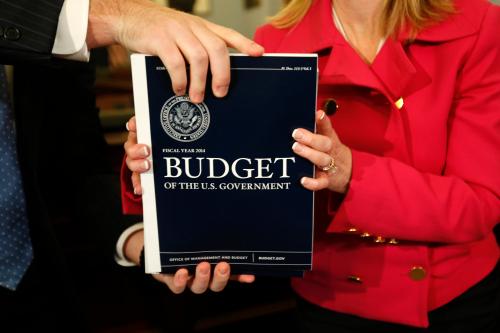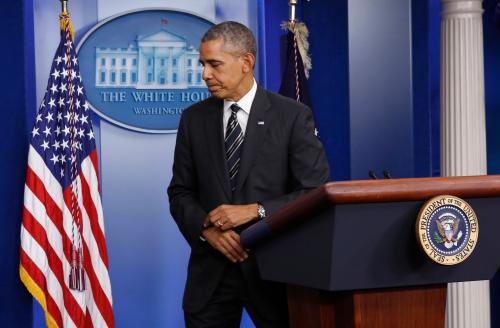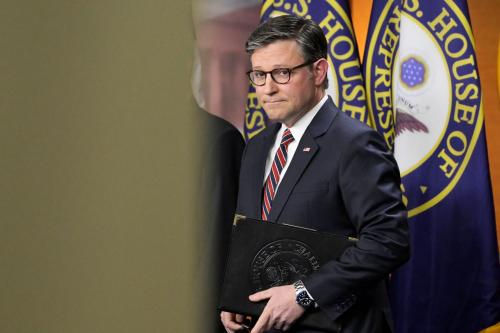It is difficult to imagine anything other than a period of partisan trench warfare for at least a few years following this election. We may hope for compromise, but history suggests that in periods of competitive politics, where either party can imagine a future turnover of power on Capitol Hill and the White House, compromise on the substance of major issues is unlikely.
In addition, the public has become frustrated and bad-tempered about Washington. Just 19% of Americans today say they trust the government in Washington to do what is right always or most of the time – down from almost 80% in the 1960s, at the beginning of the Johnson Administration.
This is bad news for the leaders of both parties. Neither party can be successful in achieving its vision of government when there is gridlock, distrust and dysfunction.
Perhaps these leaders need to draw some lessons from the business community, and in particular the idea of “co-opetition.” Co-opetition is an amalgam of cooperation and competition, and draws from the study of game theory. It describes a situation in which it is in the interest of otherwise very competitive organizations to agree on steps that enhance the overall climate for success while in no way diminishing competition. Examples include restaurants jointly agreeing to offer “Restaurant Week” discounts to boost dining out, or rival computer makers agreeing on standards for third-party software.
Even for fiercely partisan politicians there can be occasions where co-opetition makes sense. One of the most important may be in transforming the federal budget process, to move it away from crises, shutdowns, costly delays and deadlock to one that delivers budgets on time and in an orderly manner. That’s because Americans of all political hues expect government to do routine things properly, like sending out Social Security checks or making sure veterans get timely VA appointments – or passing a budget on time. When government doesn’t perform such routine tasks efficiently it degrades confidence and trust not just in government but in our democracy. Moreover, the failure to enact a budget on time harms the long-run political interests of both parties; each side wants to be able to enact its vision of a budget when it has political power, and if it cannot do so that angers its supporters. And in today’s competitive political environment, in which power changes hands quite frequently, each side knows it could find itself in the position of failing to deliver.
What type of budget process reforms would fit into a co-opetition model, in which each side could see a gain from a process that is more workable, without blunting political competition?
It would certainly not be proposals that would load the political dice heavily in favor of one side. That’s why liberals reject calls for a balanced budget requirement, seeing it as merely a backdoor device to gut their cherished programs. Conservatives, meanwhile, are leery of proposals that would classify more programs as entitlements, thereby allowing more spending to avoid regular review.
But some budget process reform ideas might well garner bipartisan support. These are ideas that could help government of whatever size and scope to function better, and so begin to restore public trust, yet do so without requiring either party to concede its principles and goals.
Here are three specific examples.
One, supplement the existing budget presentation with “portfolio budgeting.” A portfolio brings together, in one place, all the programs and tax breaks associated with each major government activity. The problem today is that many activities, such as higher education or worker training, are sprinkled throughout the budget among many programs and tax breaks, meaning it difficult to see the full range of resources involved and to have a focused debate about goals and principles. Including portfolio budgeting in the budget process would allow both supporters and detractors to show more clearly what government does and doesn’t do, and make a better case to the public for their vision. Perhaps not surprisingly, there has been bipartisan interest in the idea.
Two, end the Senate filibuster for budget votes. In today’s competitive political environment, support is beginning to grow for ending the Senate filibuster on most budget-related votes, rather than only for “reconciliation,” which is a narrow procedure sometimes used to push through entitlement and tax changes. Enabling more budget measures to proceed through the Senate without the 60 votes needed to end the filibuster could be attractive to both parties when power often changes hands.
Three, move towards longer-term budgeting. It might even be possible for both sides to agree on introducing a true long-term budget that enacts a spending and revenue plan for the next 25 or 30 years, for major programs like Social Security and Medicare and for major tax measures. Such a long-term budget could serve as a floor as well as a ceiling for tax and entitlement programs. Providing there was a formal opportunity to adjust that part of the budget as economic conditions and national goals evolved, each party might see attractions in this reform idea, since a long-term budget would spark a high profile public and congressional debate over the future course of the country. That debate might even lead to some agreement on a future course.
As the party primaries and the election demonstrated, members of Congress of both parties face political risks when they fail to enact coherent and timely budgets. When competition between parties is strong, and there is a good chance that power could change hands in the next election, political survival becomes harder for everyone. In that climate, some co-opetition on the budget process makes a lot of sense.
The Brookings Institution is committed to quality, independence, and impact.
We are supported by a diverse array of funders. In line with our values and policies, each Brookings publication represents the sole views of its author(s).







Commentary
Op-edFixing Washington’s budget process: Why co-opetition is needed
November 8, 2016